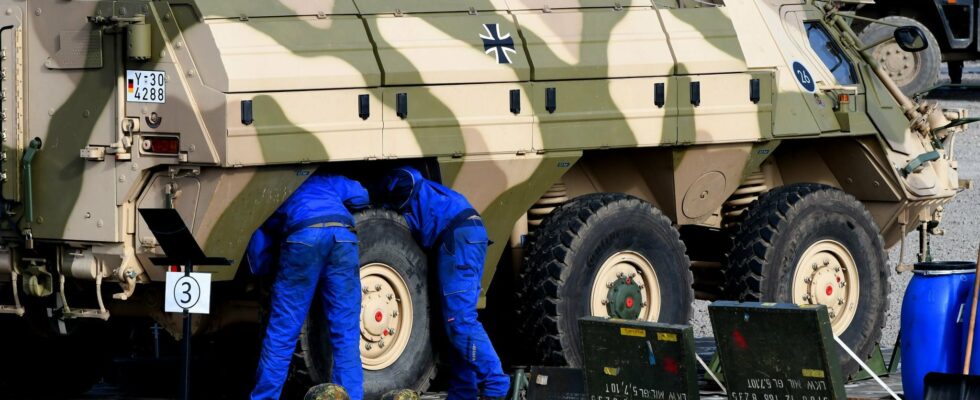Olaf Scholz is not the type to ignite crowds. Your monolithic, marmoreal face, it’s even rather… boring. This March 10, 2023, however, in front of an audience of journalists, the German Chancellor is cheerful. Soon, he announces, the country will experience a new “Wirtschaftswunder” (economic miracle). As during the golden decades (1950-1960). A year later, Germany is in recession and a rain of criticism falls on Scholz. No miracle, therefore, but the worst economic record since the Schröder years. Inflation, energy and housing crisis, demographics at half mast… The indicators are flashing red, even if Berlin, with little debt, retains a financial margin of maneuver that many envy.
We still need to be able to act. “The three parties in power [NDLR : sociaux-démocrates, verts et libéraux] don’t agree on anything, criticizes a keen observer in Brussels. Everything is blocked and will remain so until the federal elections in 2025.” A boulevard for the far right (AfD), which could soon become the second party in the country. Is Germany sick? It is unfortunately our diagnosis and this is very bad news because faced with a bellicose Russia and at a time of a possible return of Trump, Europe, on the contrary, needs a strong Germany.
EPISODE 1 – In Germany, the AfD is ever more extreme and ever more… popular
EPISODE 2 – War in Ukraine: Olaf Scholz, a difficult diplomacy that annoys the Elysée
EPISODE 3 – Failing trains, bridges in poor condition… Germany, a country in need of reconstruction
EPISODE 4 – In Germany, the end of an era in the history of social dialogue
EPISODE 5 – The German economic model is failing… Until when?
“No one knows why the chancellor [Olaf Scholz] blocks the sending of missiles [Taurus à l’Ukraine]”, complained the head of the German Air Force, Ingo Gerhartz, this February 19, during an online working meeting. The exchange with other officers should have remained secret, but it was made public, ten days later, by Russian services having exploited the insecure connection of a participant That’s not all. Die Zeit revealed that a computer flaw allowed access to 6,000 German army videoconferences, some of which were classified.
“Behind these failures lies an attitude problem: the idea that the world changed on February 24, 2022 has not yet taken hold within the army,” notes André Uzulis, editor-in-chief of Loyal, German defense magazine. Shaken by the return of war to the continent, the Bundeswehr is painfully paying off its years of naivety in the face of threats, as well as a fleet of obsolete, poorly maintained equipment and a lack of funding, the result of a long-standing disinterest in the military tool.
The change of times – “Zeitenwende” – announced by the chancellor three days after the invasion of Ukraine led to the creation of a fund of 100 billion euros. This serves, essentially, to make up for accumulated delays in the renewal of equipment programs, by purchasing American (F-35 combat aircraft, Chinook helicopters) or Israeli (Arrow 3 anti-missile defense systems).
Social cuts
Sufficient ? Not really. To make the armed forces ready for combat, the needs amount to more than 300 billion euros, according to the BundeswehrVerband, an association responsible for defending the interests of German soldiers. To keep the commitment made to NATO to devote, over time, 2% of GDP to defense, this increase will have to be included in the federal budget, which could require cuts in social programs, unless it comes back on the sacrosanct principle of the debt brake.
Defense demands “a reliable, sustainable and, yes, increasing budget”, forcefully pleads its minister, Boris Pistorius. This elected official from Lower Saxony took over, at the beginning of 2023, from Christine Lambrecht who was uncomfortable with this subject. “Pistorius knows how to communicate with the general public and tries to pass his reforms [comme l’unification de la chaîne de commandement ou la révision d’un processus kafkaïen d’appel d’offres]but it comes up against internal opposition,” notes researcher Ulrike Franke, of the European Council on International Relations.
Finally, there is the puzzle of the workforce, which has fallen by more than 1,500 soldiers between 2022 and 2023, while 16% of officer and non-commissioned officer positions are vacant. With the aging of the population, the objective of 203,000 active military personnel set for 2031 seems unattainable, unless non-nationals are recruited – 1 in 5 young people aged 18 to 25 do not have German nationality – or return to conscription. It remains to be seen whether German society, marked by a pacifist culture, is ready to make the efforts to become, as Olaf Scholz aims, “the largest conventional army in Europe”.
.
